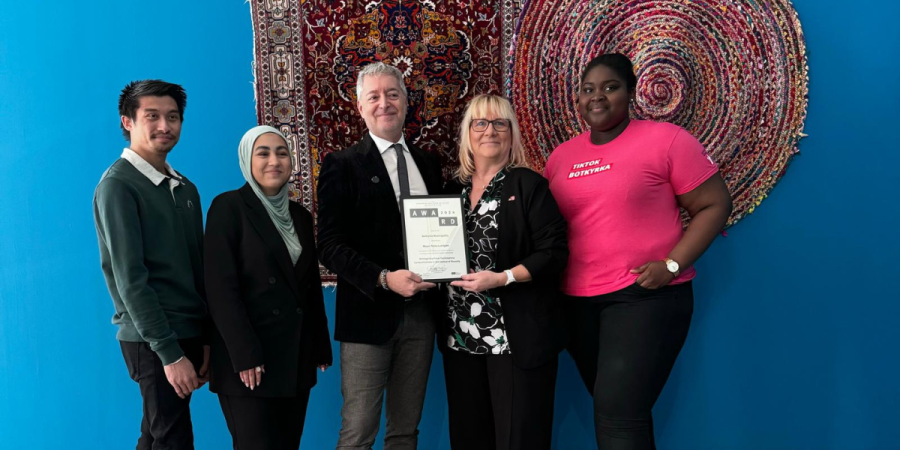
On February 10, 2025, Botkyrka celebrated a milestone as one of the two cities to win the ECCAR Award 2024 in the category of cities with more than 50,000 inhabitants. The award recognized its innovative project "Reimagining Place: Participatory Communications in the Context of Diversity", which highlights the central role of young people in shaping inclusive public spaces and social narratives.
A Day of Learning and Exchange
During his visit, ECCAR President Benedetto Zacchiroli officially presented the award to Mayor Stina Lundgren and to the young reporters of the Tiktok Botkyrka team at the Botkyrka Art Hall, in a ceremony highlighting the city’s long-term commitment to anti-racism. Following the award presentation, Director Miriam Andersson Blecher provided insights into how the Botkyrka Art Hall fosters cultural dialogue and artistic expression as tools for social cohesion. As a symbolic gesture, she gifted “Fittjakökets Kokbok”—a cookbook that encapsulates the multilingualism and multiculturalism of Fittja, one of Botkyrka’s suburbs.
At Fittjaskolan Primary School, Principal Camilla Bejmo Samuelsson and Vice Principal Åsa Wännström presented the school's approach to inclusive education, linguistic and digital competence, and democratic awareness. In Fittja, a socially marginalized area where criminal groups sometimes recruit children, the school works closely with police, social services, and parents to create a safe environment. Through the Non-Violence Project, Fittjaskolan promotes intercultural understanding, emotional development, and self-esteem, reinforcing a zero-tolerance policy against abusive language and discrimination. The school also ensures that students, who collectively speak 39 different languages, develop strong linguistic skills and a deep understanding of their rights and responsibilities, empowering them to influence society positively.
The visit continued to Alby, considered by police as one of Sweden’s most vulnerable areas due to organized crime and youth recruitment into gangs. At Kvarnhagsskolan’s After School program, Principal Alexandra Ohlén and Project Leader Dilek Baladiz outlined their work in providing extracurricular activities, mentorship, and safe spaces for young people, in line with the Convention on the Rights of the Child. The initiative, run by the Culture and Leisure Department and the Education Administration of Botkyrka in collaboration with civil society, is designed to combat violence, discrimination, and social isolation. Special attention is given to girls facing honor-related restrictions, ensuring they can safely participate in school activities. Before launching the project, Dilek Baladiz conducted research to identify children unable to attend school due to family responsibilities. Since September 2023, the project has reached 592 children in Hallunda (226 girls, 366 boys), and since September 2024, it has supported 149 children in Alby (86 girls, 63 boys). By fostering social inclusion, educational support, and a sense of pride in their community, the After School program helps create meaningful opportunities for children and youth in Botkyrka.
Meeting the ECCAR-Awarded Youth
The day concluded with a special meeting at the Multicultural Centre in Fittja with the ECCAR-awarded youth, a group of 12 teenagers (17-18 years old), who played a crucial role in “Reimagining Places”. Through participatory communications, they have provided fresh perspectives on representation, inclusion, and storytelling in Botkyrka’s diverse social landscape. As the driving force behind Tik Tok Botkyrka, they have transformed it into one of the city's most-followed communication channels, using digital media to amplify the voices of young people and challenge dominant narratives about their communities.
The visit reaffirmed Botkyrka’s pioneering role in municipal anti-racism work, strengthened its collaboration within the ECCAR network and showcased the city’s commitment to rethinking urban spaces through the voices of young people and the power of participatory dialogue, setting an example for cities across Europe, further advancing the mission of building cities free from racism and discrimination.
